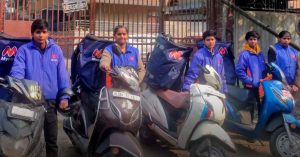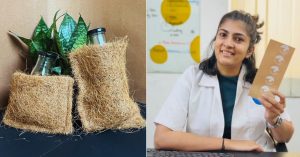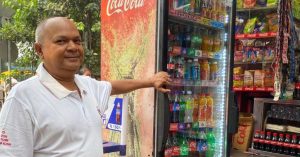Relentlessly Bullied, I Overcame Trauma to Build ‘A Little Extra’ & Secure Rs 60 Lakh on Shark Tank India
Relentlessly bullied as a child, Diksha Singhi overcame her trauma to become a body positivity influencer. Today, she runs an unconventional jewellery brand called 'A Little Extra' which recently secured funding on Shark Tank India.
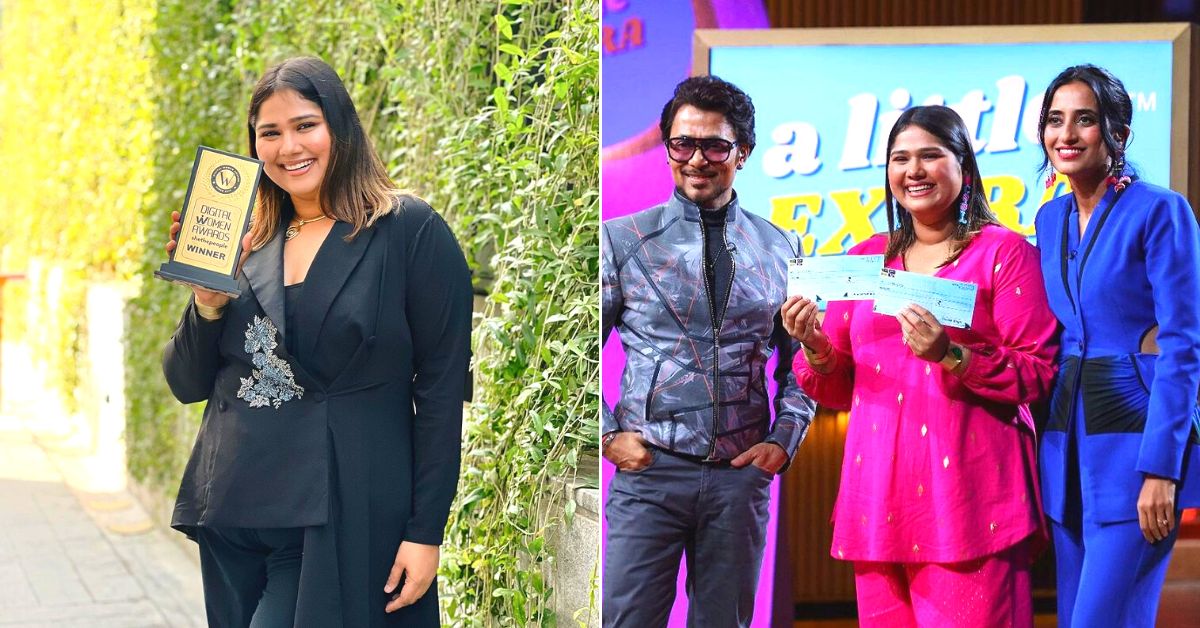
During our recent Zoom call with 29-year-old Diksha Singhi — a Delhi-based entrepreneur and body positivity influencer — her phone wouldn’t stop ringing. Just last week, she showcased her venture ‘A Little Extra’ on the third season of Shark Tank India, securing investment commitments worth Rs 60 lakh (for a 7.5% stake) from Anupam Mittal, the CEO of Shaadi.com, and Vineeta Singh, founder of Sugar Cosmetics.
From enduring constant ridicule, bullying and fat-shaming throughout her childhood to emerging as a prominent voice in body positivity on Instagram, setting up her own unconventional accessories brand and making a successful appearance on Shark Tank India, Diksha Singhi has come a long way.
Speaking to The Better India, Diksha talked about her journey of overcoming childhood trauma, sharing her story on public forums, and becoming a body positivity influencer and entrepreneur.
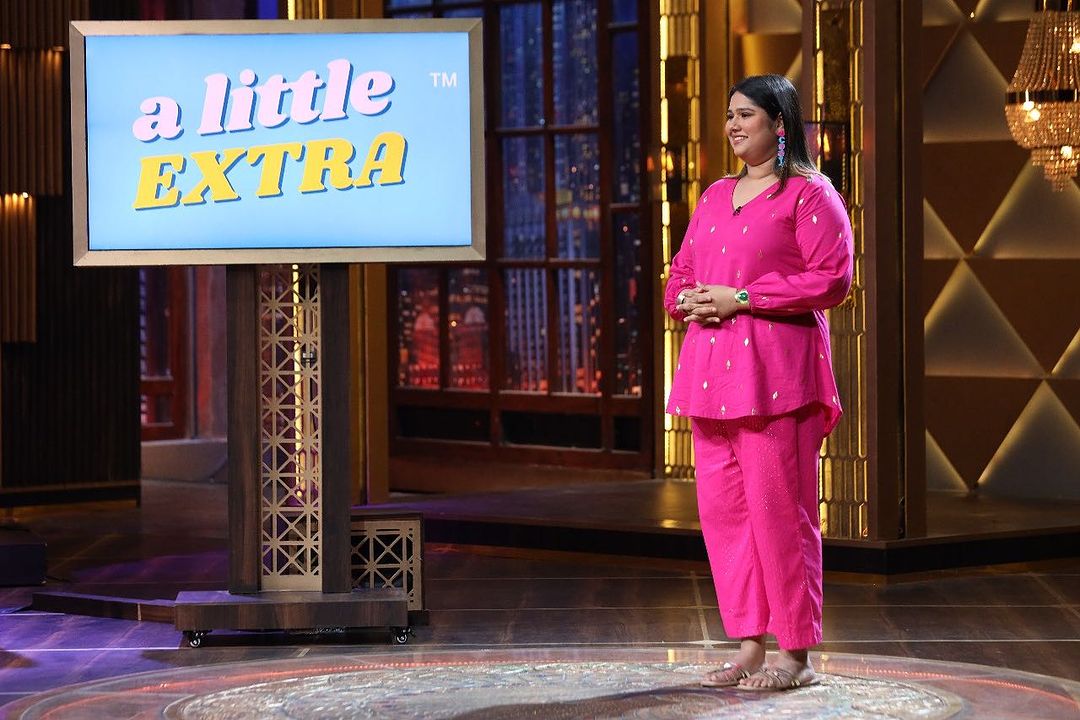
‘Always been a fat child’
Born and raised in Guwahati, Assam, Diksha recalls, “I have always been a fat child. As a fat child, you’re told the most ridiculous things by people around you. Growing up, I was in a boarding school and heavily bullied for it. In school, I was not selected for theatre or dance performances because of my appearance. People made assumptions that I couldn’t play sports because I was fat. People started calling me a tomboy because I would wear loose clothes.”
“Wearing loose clothes was not a conscious fashion decision. I could never find clothes in my size and had to shop in the men’s section. That’s why people started calling me a tomboy. But this sort of bullying wasn’t just restricted to school. I was even called out by my relatives. In fact, there was a time when I used to love swimming. But one day my swimming teacher told me that I should not wear a V-cut swimming costume because I looked ‘hideous’. And that feeling of humiliation stayed with me for so long that I started hating swimming,” she adds.
It took Diksha many years to unlearn all of those things that were said about her body.
“I could see the magic it [unlearning] did to my health and mental health once I started letting go of the things that people said about me and the notions my immediate society had about body shape and appearances. What I have learnt in life is that if there are things that trouble you as a child and if you do something about them when you’re older, it gives you an innate sort of satisfaction. I never intended to become a body positivity influencer or creator,” she recalls.
And a lot of that unlearning began once Diksha moved to Delhi for college in 2013 and started writing about her experiences in blog posts and then on Instagram on a variety of subjects.
“I was someone who would write long captions with everything I posted on Instagram. And that was just my way of telling my story. Despite having just 500-odd followers on Instagram at the time, I would regularly pen down my thoughts on anything from fashion to travel. After finishing college in 2016, I became a freelance social media marketing consultant, writing and publishing content for different magazines or online platforms,” she recalls.
Eventually, there came a phase when she seriously began examining the things that had happened to her in the past and how they impacted her decisions. In a series of Instagram posts in March 2018, she posted pictures of herself in swimwear for the first time. This was Diksha reclaiming her body and responding to those who traumatised her all these years.
“There were these posts I wrote on social media about my story with my body and it got a lot of traction. There were a lot of women who wrote comments on my post sharing their own stories and that’s how I started creating content as a body positivity influencer,” she recalls.
Today, Diksha has more than 1,26,000 followers on Instagram.
“I never intended to become a blogger or a content creator. This isn’t a ‘job’ for me. Yes, money comes in various forms like brand collaborations, but creating content to make money has never been the objective. It has always been about sharing my story,” she says.
As a body-positive content creator in this space, Diksha has created content ranging from recommendations of brands that make apparel in plus sizes to [verbal] comebacks against relatives saying things about her physical appearance. “I have shared such content all across my personal social media page. Through making such content, I became that elder sister or friend [to my followers] that I never had when I was a child,” she adds.
From content creator to entrepreneur
Growing up in a ‘business family’, Diksha always had the desire to start one herself. But the decision to establish ‘A Little Extra’ in August 2020 wasn’t just about following a family tradition.
“There was a time when I was experimenting with fashion but there weren’t enough clothes [that fit my size] available in the market. So, I started employing different accessories to look more fashionable. Even while travelling to different countries, particularly in Asia, I couldn’t find clothes for people my size. My idea was to always shop for jewellery,” she recalls.
“While my friends went to the mall and shopped for clothes, I also wanted something to shop for. So, I would visit the jewellery section because the items on sale there did not come with the kind of size limitations you see in apparel wear. In fact, on one of my posts, I’ve had people writing comments like ‘Went shopping for clothes but came back with a scrunchie’. Over time, I became a jewellery junkie and I decided to venture into the accessories space,” she recalls.
“Amid the [COVID-19] pandemic, I was back home thinking about what to do next with my life. What I found was a gap in the affordable accessories segment and measured all the pros and cons associated with running such a business. Eventually, I established ‘A Little Extra’ in August 2020 with an initial investment of Rs 5,000, and here we are today,” she adds.
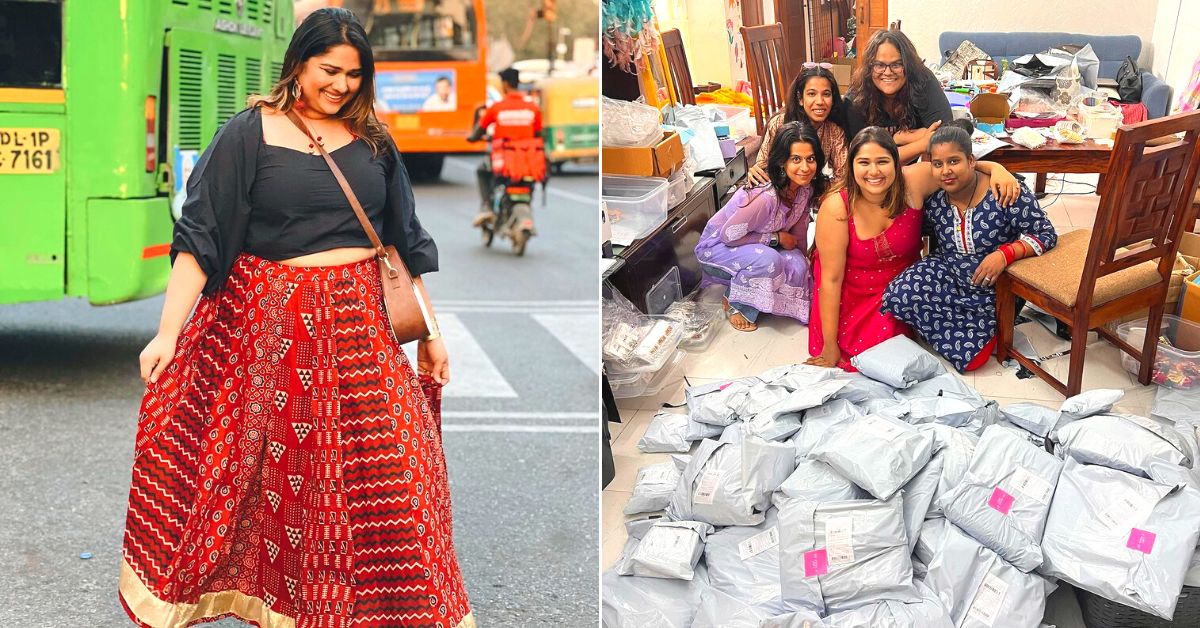
‘A Little Extra’
Most of the jewellery made at ‘A Little Extra’ has a “distinctive element” to it, according to Diksha.
“If you buy conventional jewellery, they’re either stone-based or they have a certain design or aesthetic. We wanted to make jewellery specific for an occasion, emotion or lifestyle. For example, if it’s Navratri, what better than to wear our ‘Durga earrings’ that are colourful, bright and have the chunkiest elements of shell, mirror, beads, etc? If you want to watch a football match in a stadium, cheering for your favourite team, why just wear those regular earrings? Why not wear earrings shaped and designed like a football?” she says.
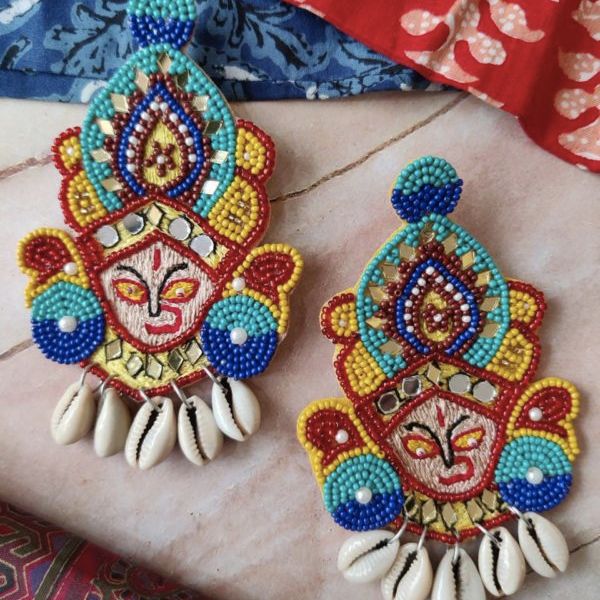
“We want to create a certain emotional angle with the jewellery that you’re buying. Given the kind of occasion/emotion-specific earrings or the neck pieces we design, it also becomes easier to give the kind of accessories we make to other people as gifts. But we are also aware of a market which is looking for accessories with a minimal aesthetic, and as a result, we also make jewellery with minimal/simple designs but with an extra touch,” she adds.
For example, they have this limited collection of very small gold-plated brass earrings designed in the shape of a dragon. “This was inspired by a very energetic and inspiring petite friend who was either bullied for being small in stature or not taken seriously as a result. Despite people counting her out, her energy has remained undiminished like a dragon. We also employ different handmade art forms like Kada, beadwork, Kundan, brass, terracotta, cane, etc,” she says.
How do they make these accessories?
A Little Extra works with karigars (artisans) specialising in different handmade art forms. Since the venture deals in various art forms, Diksha argues that she can’t have something in-house for production purposes.
“The way our karigars move their hands is something you and I cannot do. They’re skilled and work best when they’re in their community. You can’t pick them out of a village in West Bengal, bring them to Delhi, and expect them to do quality work. They would not be happy. They want to stay with their families. So our idea was to have these karigars work in their own communities,” she explains.
“We present them with whatever designs we have come up with here. We send the designs across to our manager stationed with these artisan communities who then sits with the karigars and develops those designs. Following this, they send us items for sampling, which we assess and see if there are any changes we would like on them. They eventually send us further samples which we approve and send for production. We follow this process for all our products,” she adds.
Talking about terracotta, Diksha’s team works with karigars from Assam and West Bengal. When it comes to beadwork, they work with karigars from Delhi-NCR states. If they’re employing Kundan (a traditional form of gemstone jewellery), they work with karigars from Rajasthan.
“My mantra when it comes to working with karigars is to pay them what they ask for. Throughout my journey, I have seen people in my industry try to exploit them. My approach has always been the more they grow, the more we grow. Successfully selling over 80,000 products and developing a range of accessories with over 500 designs, we’ve grown together. Today, ‘A Little Extra’ is a women-led enterprise, and I currently have eight full-time women employees with me,” she says.
The Shark Tank experience
Diksha has nothing critical to say about her experience of Shark Tank India.
As she recalls, “Although I did prepare my pitch and worked on the possible types of questions the Sharks would ask me, there was nothing scripted about what questions were asked, whether I would secure an investment, or if certain Sharks were already willing to invest in my venture. The Shark Team India [production] team did assist me in fine-tuning my pitch but in the end, it’s your call whether to accept their recommendations or not.”
It was a one-hour-long pitch, she informs, which was then cut down to 17-20 minutes for viewers.
Although both the Sharks (Anupam and Vineeta) agreed to invest in her venture, there is currently a more detailed due diligence process underway.
“If someone is willing to invest Rs 60 lakh into your venture, they have to secure their funding and know that they are investing in a legitimate business. On the entrepreneurial side, I have to sit with my team to assess the share agreements and other documents sent by the Sharks’ teams as well. All this due diligence work will take about six months or so,” she notes.
(Edited by Pranita Bhat; Images courtesy Instagram/Diksha Singhi and Instagram/A Little Extra)
If you found our stories insightful, informative, or even just enjoyable, we invite you to consider making a voluntary payment to support the work we do at The Better India. Your contribution helps us continue producing quality content that educates, inspires, and drives positive change.
Choose one of the payment options below for your contribution-
By paying for the stories you value, you directly contribute to sustaining our efforts focused on making a difference in the world. Together, let's ensure that impactful stories continue to be told and shared, enriching lives and communities alike.
Thank you for your support. Here are some frequently asked questions you might find helpful to know why you are contributing?






